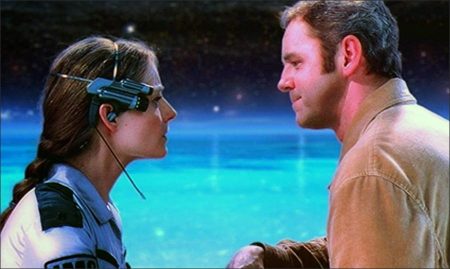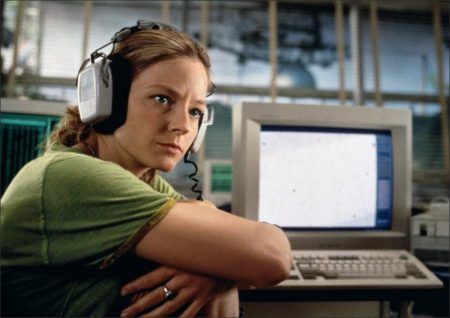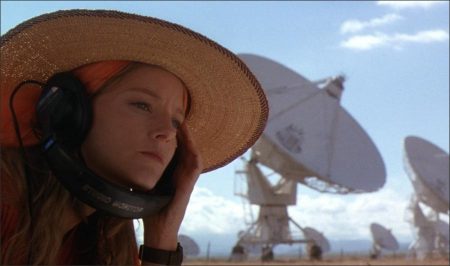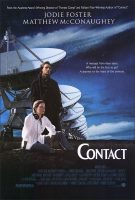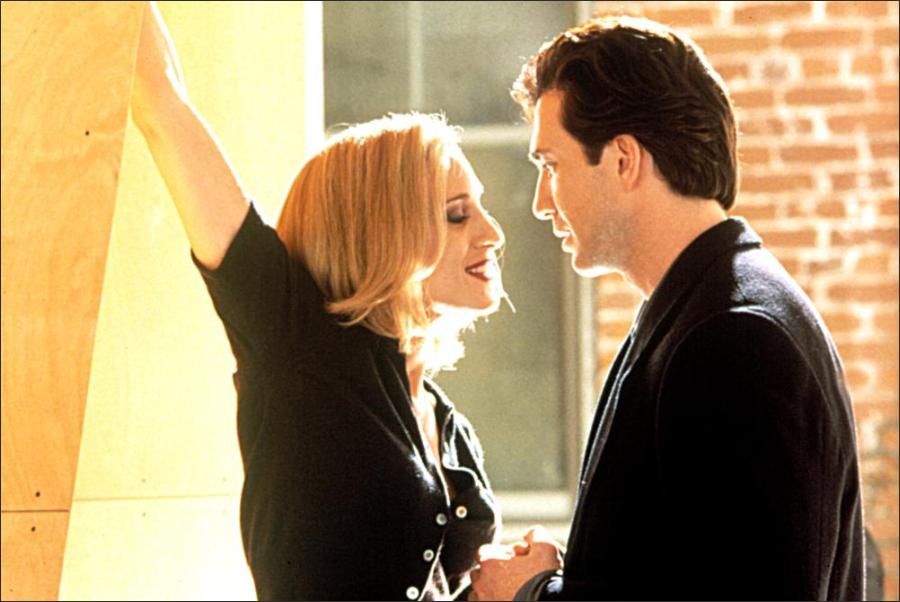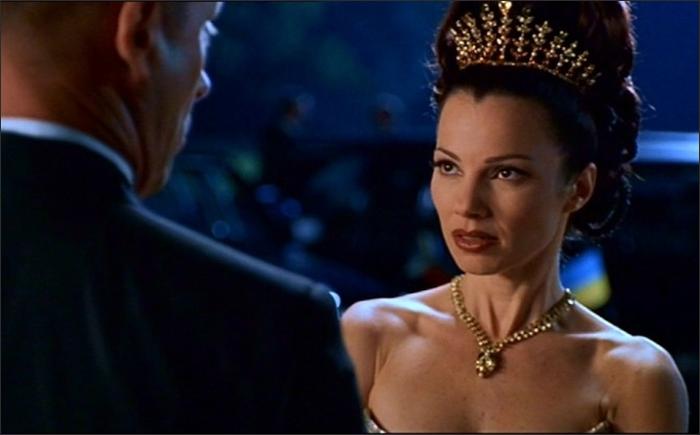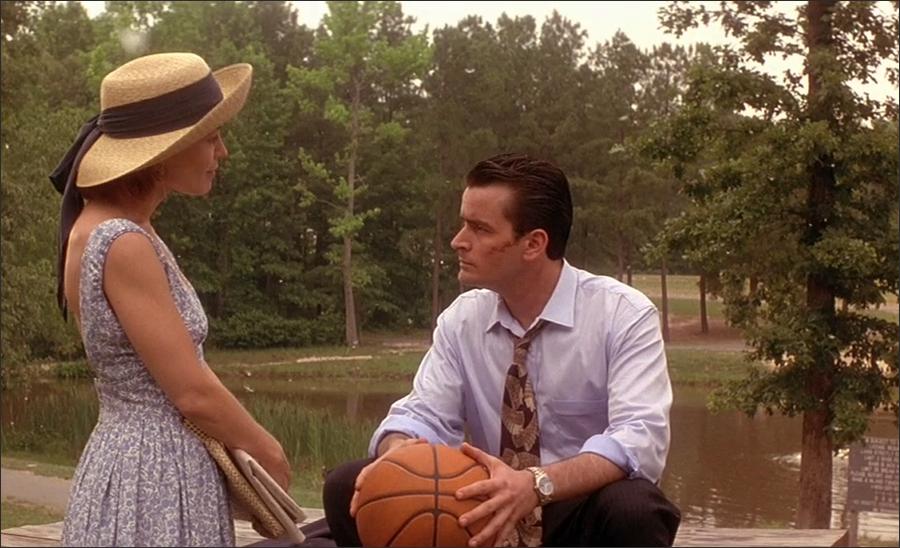In some ways, Contact is just like the universe: big, star-bright and seemingly endless. Not to mention that it begins with a big bang, gradually falls into a lull and finally succumbs to entropy. Adapted from Carl Sagan’s 1985 novel, this high-minded yarn concerns the discovery of extraterrestrial intelligence, but its focus subsequently becomes a preachy debate between sanctity and science. People magazine’s mail seems penetrating in comparison to this contrived back-and-forth. No stump goes unmounted, no pulpit unpounded.
Never mind that the picture’s stunning prologue eloquently suggests that God and little green men are one and the same. This lovely sequence opens with a shot of Earth as we’ve seen her through NASA portholes. Wrapped in a boa of clouds, she orbits the sun, her stately journey accompanied by a racket of sound bites, laugh tracks and newscasts.
The aural jetsam flows outward toward Mars, past Jupiter and finally beyond our solar system, beyond the Milky Way, beyond all knowing. And the camera follows. With every light year, the universe grows a little quieter, the commercials, pop tunes and radio shows a little older, until finally there’s silence in the blackness of space.
There’s no topping the sequence, and we haven’t even begun the story, which revolves around the obsessive quest of astronomer Ellie Arroway (Jodie Foster) to hear other voices in the universe. This is a woman who does a whole lot of listening, as flashbacks to her tragic childhood underscore. We Earthlings are making such a ruckus, she reckons, surely someone out there has noticed. And after too much screen time, she intercepts a transmission from the distant star Vega. Composed of a series of prime numbers, the broadcast also includes an encoded message hidden in a reproduction of Earth’s first telecast: Adolf Hitler opening the 1936 Olympics.
When the federal government threatens to shut down her project, Ellie calls a news conference and announces her discovery to the world, thereby heading off the threat. Then, while she and her crack team attempt to break the Vegan code, Dr. David Drumlin (Tom Skerritt), a former mentor, takes over the project with the backing of the national security chief (James Woods).
Ellie finds an unexpected ally in S.R. Hadden (John Hurt), an eccentric billionaire who has had his eye on her since she was a girl. In a flashback, we learn that she gave up on God after her father’s death in her early childhood. Unbeknown to her, Hadden’s been playing Daddy Warbucks to her Little Orphan Ellie ever since.
Whenever she runs into a dead end in this ludicrous adventure, Hadden throws some money around and she’s back in business. He even decodes the alien transmission, which proves to be the blueprints for a one-person spacecraft presumably programmed to take its passenger to Vega, some 26 light-years away. Naturally, Ellie wants to go. But then so does Drumlin, who insists that an international committee choose Earth’s representative from a roster of candidates.
The Rev. Palmer Joss (Matthew McConaughey), a former lover of Ellie’s who has become such a close adviser to President Clinton that he attends Cabinet meetings (so much for the separation of church and state), is among her most outspoken opponents on the committee. She may be strong, smart, courageous, determined, deserving, curious, passionate and healthy as a horse, but she doesn’t believe in God. And we can’t be shooting agnostics off to represent the good folks of peaceful planet Earth, can we?
McConaughey has the silliest role in this silly movie — although Skerritt’s mustache-twirling villain is a close second. Always careful to keep his best side to the camera, his hair mussed just so and his jaw squared, McConaughey is more of a fashion spokes-minister than a man of the cloth. He carries the Holy Writ as if it were an accessory. You fully expect to see “Bible by Givenchy” in the credits.
Foster, who’s as tense as Joan of Arc at a weenie roast, comes off as the more devout of the pair. Unconcerned about her appearance, obsessed with Vega, her character is an astro-nun. A lot of work goes into her performance, but the role is not an especially sympathetic or believably human one.
“Contact,” a treatment for a screenplay before Sagan turned it into a book, isn’t about people at all. It’s about ideas, and as such it’s pretty coldblooded. Though screenwriters James V. Hart and Michael Goldenberg provide some comic relief now and again, they’re saddled with the weighty cerebral musings of Sagan and his collaborator and widow, Ann Druyan.
Director Robert Zemeckis, who married special effects and story so delightfully in “Forrest Gump” and “Back to the Future,” seems awed by the project’s grand scale. Most of its effects, aside from those in the glorious prologue, we’ve seen before. (Like several of his predecessors in “Gump,” Clinton makes a series of computer-generated appearances.) But the jazzier stuff harks back to the psychedelia of “2001: A Space Odyssey,” the grandpappy of all modern effects movies.
“Contact” has more in common with that seminal space opera than it does with recent science fiction. And it’s certainly commendable to raise your sights above shootouts with slimy aliens. But though Stanley Kubrick’s “Odyssey” was also about the gift of alien technology and what we make of it, he had the good sense to load his cast onto the spaceship and get underway as fast as he jolly well could. “Contact” takes forever to lift off.
Contact (1997)
Directed by: Robert Zemeckis
Starring: Jodie Foster, Matthew McConaughey, James Woods, John Hurt, Tom Skerritt, Angela Bassett, Sami Chester, William Fichtner, Timothy McNeil, Max Martini
Screenplay by: James V. Hart, Michael Goldenberg
Production Design by: Ed Verreaux
Cinematography by: Don Burgess
Film Editing by: Arthur Schmidt
Costume Design by: Joanna Johnston
Set Decoration by: Michael Taylor
Art Direction by: Bruce Crone, Lawrence A. Hubbs
Music by: Alan Silvestri
MPAA Rating: PG for some intense action, mild language and a scene of sensuality.
Distributed by: Warner Bros. Pictures
Release Date: July 11, 1997
Hits: 269

